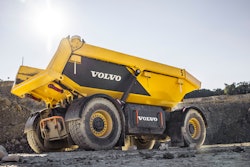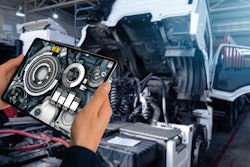
In another step towards a fossil-free society, SCA and Scania are together developing the first electric timber truck with a technical capability of up to 80 tonnes (T) total weight.
It is possible to drive longer distances with heavy electric transports. Scania and SCA are proving that with a new battery-electric vehicle capable of total weights of up to 64 T on public roads and 80 T on private roads. The electric truck will transport timber in the Swedish region of Västerbotten, between SCA’s terminal in Gimonäs and its papermill in Obbola outside Umeå, starting already in 2022. For SCA, which is Europe’s largest private forest owner and maker of sawn wood products, packaging materials and pulp, electrifying road transport is an important part of work to reduce its environmental impact. Every year, SCA transports about 8.5 million cubic meters of wood to industries, utilizing 265 timber trucks in collaboration with 87 haulage contractors.
”The cooperation with Scania is an important way for us to jointly find innovative solutions for sustainable transport. Electric timber trucks will be a strong contribution to SCA’s work with sustainability, where we are part of the solution for a fossil-free world. By running just one electric truck between Gimonäs and Obbola, we can reduce our carbon emissions by about 55,000 kg per year,” says Hans Djurberg, Head of Sustainability, SCA.
“As we now demonstrate that it is also possible to electrify very heavy transport, there is a growing need to build out charging infrastructure for heavy vehicles. SCA can further increase our contribution to help fight climate change, but a serious effort must be made to build out charging infrastructure. This responsibility ultimately falls on the government,” says Jörgen Bendz, Head of Wood Supply, SCA.
The vehicle solution that Scania is developing, in close collaboration with SCA and research institute Skogforsk, is a part of the shift towards sustainable transport, which Scania has long advocated for, not least together with progressive customers.
”The key to reaching zero emissions in transport is electrification and we will get there together with customers and other stakeholders that share our values. Partnerships like this one with SCA, where we are early out and demonstrating what is possible, is a clear sign of a change of pace that is needed for us to be fossil free and deliver on the targets of the Paris agreement,” says Fredrik Allard, Head of E-mobility at Scania.
At Scania, future solutions are simulated together with different partners and through deep analysis. When it comes to SCA, Scania is developing a vehicle that is optimized for SCA’s specific transport assignments.
“An electric timber truck is a symbol for something pretty cool. Transport of timber specifically has been talked about as something that may never be possible to electrify. The developments of the past few years, together with what we are now presenting with SCA, show just how quickly things are progressing with regards to both vehicles and batteries,” says Allard.



















